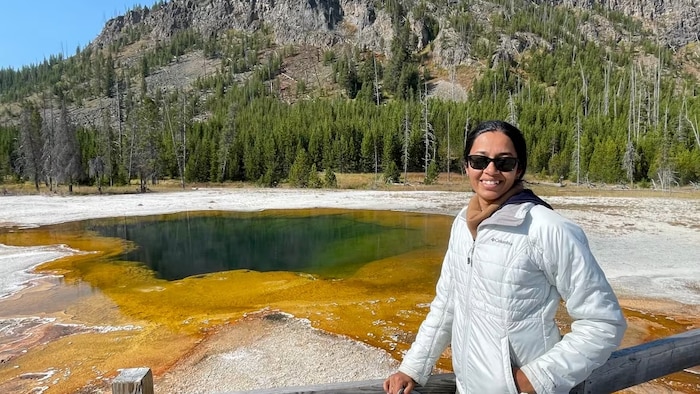
I have learned that feelings of home and belonging don’t always come as a package
This First Person article is written by Sindhu Mahadevan, who is a recent immigrant to Canada and is passionate about the topic of immigration.
On a hike in the Thousand Islands region of eastern Ontario this summer, I met a couple of American tourists. As we chatted, they asked So, are you Canadian?
I sort of tripped on that question.
The voice in my head said, “I’m a Canadian permanent resident.”
The question was one of belonging, but the only response I could access was a description of my immigration status. I moved to Canada in late 2021, and my work to find meaningful belonging is just beginning.
I know what it’s like to have a deep relationship with a country that’s not my own. I grew up in India and lived in the U.S. as a visa holder for nearly a decade. I befriended many warm, generous Americans and invested effort to understand American culture, politics, social issues and history.
But while the Americans I met made me feel welcome, the U.S. immigration system never let me forget that I was not an American. In its words, I was a non-resident alien
— and if the terminology alone wasn’t sufficiently alienating — the system’s policies, politics and my interactions with various agencies provided regular reminders of my outsider-ness.

Sindhu Mahadevan at Yellowstone National Park in Wyoming in 2021. (Submitted by Sindhu Mahadevan)
PHOTO: (SUBMITTED BY SINDHU MAHADEVAN)
Those experiences were distressing — and they cast long shadows.
A big move
Immigrating to Canada came with its own challenges. My application was stymied first by the COVID-19 pandemic and then by the Afghanistan crisis in summer 2021. All told, we spent over a year in limbo. Our desperate emails and calls to Immigration, Refugees and Citizenship Canada were met with a lack of meaningful response.
The pandemic compounded the frustration, leaving no shortage of pensive days. I would open Google Maps and trace the route from my own blue dot in Bloomington, Ill., to Toronto. The promise of freedom and belonging felt distressingly out of reach.
Then, just as the weather was turning in the fall of 2021, my life did a 180-degree flip.
I went from living in a country with which I had forged a relationship but resisted accepting me to a country that I wasn’t emotionally connected to but had already accepted me.
Old anxieties
Every now and then, the immigration anxiety from my time in America makes an unwelcome guest appearance into the present.
In March 2022, my husband and I were returning to Toronto from our first trip outside Canada. As we headed toward immigration, my old anxieties escaped into words.
Will they ask me where I work?,
I blurted out to my husband.
At a rational level, I knew I could rest easy as a permanent resident. But standing in that snaking line, my imagination conjured up a window with an unfriendly — even hostile — immigration official on the other side. Questions designed to trip you up. The feeling of being on trial but guilty until proven innocent.
Not this time.
The lineup for Canadian citizens and permanent residents led to a relaxed officer who glanced briefly at my PR card.
Welcome home!
he said with a smile and waved me through.
Welcome. Home.
Did you hear that?
my husband asked, smiling jubilantly.
This simple recognition by Canada — that when I’m here, I’m home — is foundational. It is the crux of the eventual belonging I hope to build here.
A house, a home
For the first time in nearly a decade, I am not living on shaky ground.
Looking back, I realize that I felt the difference long before I could articulate it.
When we moved into our first rental home in Canada, I performed a small, house-warming ritual that’s practised in South Indian culture. The ritual involves boiling milk in the new home and drinking a beverage made from it. The boiling milk is considered auspicious and symbolizes prosperity in the new home.
I had never performed this simple ritual in the U.S. despite living in many residences across numerous cities over nearly a decade.
It’s a mindset thing.
On a visa, you’re living on borrowed time. Back then, I could only dream wistfully of the surety, stability and peace that I now have as a permanent resident. This peace has been a long time coming.
What I did not realize, though, is that the feeling of home and belonging don’t always come packaged together. Canada is my new home, and with that critical foothold, I can now start the hard work of building my own unique flavour of Canadian-ness.
The days of longingly looking at Toronto on a map are behind me. I now look to a place — a place of belonging — that cannot be found on a map.
Perhaps someday when asked if I am Canadian, I’ll be able to answer Yes
without skipping a beat.
Perhaps someday being Canadian will become a natural part of me — just like being Indian.
Sindhu Mahadevan · for CBC First Person via RCI


Thank you for your sharing. I am worried that I lack creative ideas. It is your article that makes me full of hope. Thank you. But, I have a question, can you help me?